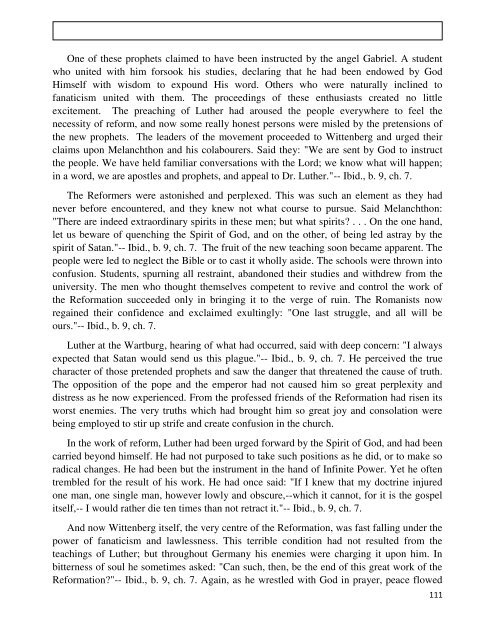Finishing the Race
Of all the games instituted among the Greeks and the Romans, the races were the most ancient and the most highly esteemed … The contests were governed by strict regulations, from which there was no appeal. Those who desired their names entered as competitors for the prize had first to undergo a severe preparatory training. Harmful indulgence of appetite, or any other gratification that would lower mental or physical vigour, was strictly forbidden. For one to have any hope of success in these trials of strength and speed, the muscles must be strong and supple, and the nerves well under control. Every movement must be certain, every step swift and unswerving; the physical powers must reach the highest mark.
Of all the games instituted among the Greeks and the Romans, the races were the most ancient and the most highly esteemed … The contests were governed by strict regulations, from which there was no appeal. Those who desired their names entered as competitors for the prize had first to undergo a severe preparatory training. Harmful indulgence of appetite, or any other gratification that would lower mental or physical vigour, was strictly forbidden. For one to have any hope of success in these trials of strength and speed, the muscles must be strong and supple, and the nerves well under control. Every movement must be certain, every step swift and unswerving; the physical powers must reach the highest mark.
You also want an ePaper? Increase the reach of your titles
YUMPU automatically turns print PDFs into web optimized ePapers that Google loves.
One of <strong>the</strong>se prophets claimed to have been instructed by <strong>the</strong> angel Gabriel. A student<br />
who united with him forsook his studies, declaring that he had been endowed by God<br />
Himself with wisdom to expound His word. O<strong>the</strong>rs who were naturally inclined to<br />
fanaticism united with <strong>the</strong>m. The proceedings of <strong>the</strong>se enthusiasts created no little<br />
excitement. The preaching of Lu<strong>the</strong>r had aroused <strong>the</strong> people everywhere to feel <strong>the</strong><br />
necessity of reform, and now some really honest persons were misled by <strong>the</strong> pretensions of<br />
<strong>the</strong> new prophets. The leaders of <strong>the</strong> movement proceeded to Wittenberg and urged <strong>the</strong>ir<br />
claims upon Melanchthon and his colabourers. Said <strong>the</strong>y: "We are sent by God to instruct<br />
<strong>the</strong> people. We have held familiar conversations with <strong>the</strong> Lord; we know what will happen;<br />
in a word, we are apostles and prophets, and appeal to Dr. Lu<strong>the</strong>r."-- Ibid., b. 9, ch. 7.<br />
The Reformers were astonished and perplexed. This was such an element as <strong>the</strong>y had<br />
never before encountered, and <strong>the</strong>y knew not what course to pursue. Said Melanchthon:<br />
"There are indeed extraordinary spirits in <strong>the</strong>se men; but what spirits? . . . On <strong>the</strong> one hand,<br />
let us beware of quenching <strong>the</strong> Spirit of God, and on <strong>the</strong> o<strong>the</strong>r, of being led astray by <strong>the</strong><br />
spirit of Satan."-- Ibid., b. 9, ch. 7. The fruit of <strong>the</strong> new teaching soon became apparent. The<br />
people were led to neglect <strong>the</strong> Bible or to cast it wholly aside. The schools were thrown into<br />
confusion. Students, spurning all restraint, abandoned <strong>the</strong>ir studies and withdrew from <strong>the</strong><br />
university. The men who thought <strong>the</strong>mselves competent to revive and control <strong>the</strong> work of<br />
<strong>the</strong> Reformation succeeded only in bringing it to <strong>the</strong> verge of ruin. The Romanists now<br />
regained <strong>the</strong>ir confidence and exclaimed exultingly: "One last struggle, and all will be<br />
ours."-- Ibid., b. 9, ch. 7.<br />
Lu<strong>the</strong>r at <strong>the</strong> Wartburg, hearing of what had occurred, said with deep concern: "I always<br />
expected that Satan would send us this plague."-- Ibid., b. 9, ch. 7. He perceived <strong>the</strong> true<br />
character of those pretended prophets and saw <strong>the</strong> danger that threatened <strong>the</strong> cause of truth.<br />
The opposition of <strong>the</strong> pope and <strong>the</strong> emperor had not caused him so great perplexity and<br />
distress as he now experienced. From <strong>the</strong> professed friends of <strong>the</strong> Reformation had risen its<br />
worst enemies. The very truths which had brought him so great joy and consolation were<br />
being employed to stir up strife and create confusion in <strong>the</strong> church.<br />
In <strong>the</strong> work of reform, Lu<strong>the</strong>r had been urged forward by <strong>the</strong> Spirit of God, and had been<br />
carried beyond himself. He had not purposed to take such positions as he did, or to make so<br />
radical changes. He had been but <strong>the</strong> instrument in <strong>the</strong> hand of Infinite Power. Yet he often<br />
trembled for <strong>the</strong> result of his work. He had once said: "If I knew that my doctrine injured<br />
one man, one single man, however lowly and obscure,--which it cannot, for it is <strong>the</strong> gospel<br />
itself,-- I would ra<strong>the</strong>r die ten times than not retract it."-- Ibid., b. 9, ch. 7.<br />
And now Wittenberg itself, <strong>the</strong> very centre of <strong>the</strong> Reformation, was fast falling under <strong>the</strong><br />
power of fanaticism and lawlessness. This terrible condition had not resulted from <strong>the</strong><br />
teachings of Lu<strong>the</strong>r; but throughout Germany his enemies were charging it upon him. In<br />
bitterness of soul he sometimes asked: "Can such, <strong>the</strong>n, be <strong>the</strong> end of this great work of <strong>the</strong><br />
Reformation?"-- Ibid., b. 9, ch. 7. Again, as he wrestled with God in prayer, peace flowed<br />
111
















